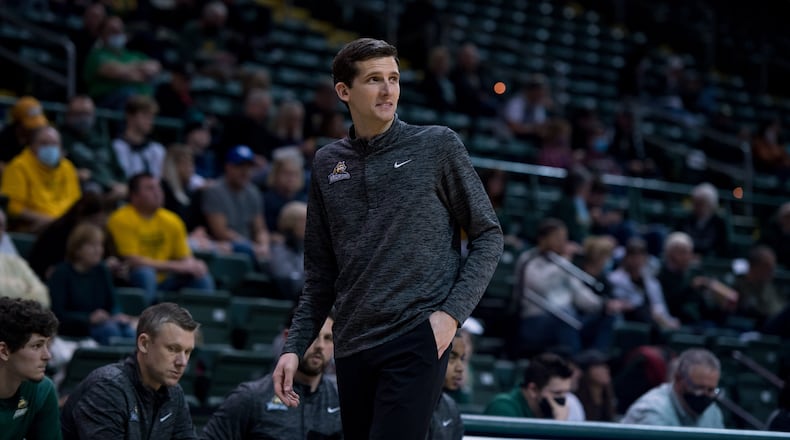But they were a fledgling Division-I team then, and that style, while entertaining, wasn’t sustainable. Most assumed it would remain part of the program’s distant past — until resurfacing last season.
The Raiders, who went 18-14, lost to Colorado State, 105-77, in the season opener and to Northern Kentucky, 99-97, in a Horizon League tourney game. And there were plenty of toothless defensive efforts in between.
They also won by scores of 106-98 and 107-99 — games that hardly fit the profile of a program that prided itself on getting stops.
New coach Clint Sargent had a front-row seat for those games as the lead assistant, and he’s had an entire offseason to reflect on what went wrong in coach Scott Nagy’s final year.
But he admits he’s as puzzled about the defensive woes as he was last March.
“I’m still trying to figure it out,” he said.
The Raiders finished fourth nationally in scoring with an 86.5 average. Only Alabama (90.1), Kentucky (89.0) and Arizona (87.1) scored more.
They also led the nation in field-goal shooting at 53.03%, a record in the Raiders’ D-I era (since 1987). Gonzaga was second at 51.8.
But despite all of that offensive firepower and a high basketball IQ as a team, they were near the bottom in NCAA defensive stats.
They gave up 81.2 points per game. That was 346th out of 351 D-I teams and their worst showing since allowing 88.6 in 1990-91.
Opponents shot 47.4%, which was 334th nationally and also the team’s worst effort since foes hit 49.7% in 1990-91.
“We need to bridge that gap and bring our defensive numbers up. And to me, that just starts with getting your guys to trust each other and connect with one another on that end of the floor,” Sargent said.
The coaches prefer to measure their offense and defense with efficiency numbers, believing those provide a better snapshot since they take into account pace of play.
The Raiders weren’t much better there, either. They were eighth in the nation offensively with 1.154 points per possession and 341st in points allowed per possession at 1.108.
“The best thing we can take from that, in terms of efficiency, is that we were the best Horizon League team offensively, and we finished FOURTH,” said Sargent, who appears set on implementing zones and changing up defenses this year.
“That’s what I’m trying to get guys to understand: If you want to win, you have to get your mind off offense.”
Well, maybe not COMPLETELY off offense.
Sargent hopes the Raiders can duplicate their numbers on that end. They averaged 5.3 points more than the league’s second-highest scoring team.
It won’t be easy since they have to replace a pair of 2,000-point scorers in Trey Calvin and Tanner Holden. But just as Nagy was fond of saying good defense leads to good offense, Sargent sees how the opposite also can be true.
“You can’t be good defensively if you’re bad on offense, typically. You need to be good offensively to be good defensively because you need to stay out of transition (opponents’ fastbreaks),” he said.
“Ultimately, you want to set your defense, and the best way to set your defense and get five on five is to score — certainly not take bad shots or turn the ball over. Teams that do that have a really hard time.
“But that’s why, again, if you look back at last year’s team, it’s really hard to figure out.”
About the Author
